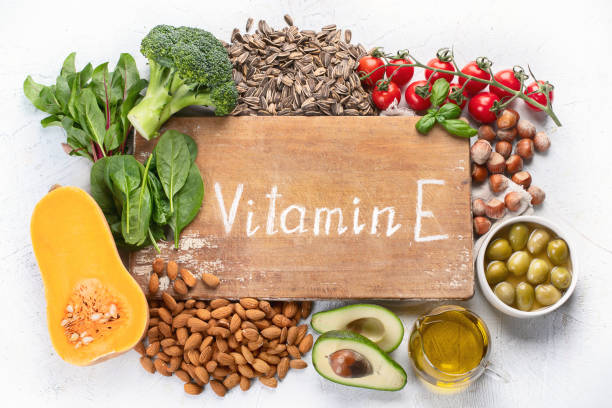If you eat a balanced and varied diet, you don’t have to worry about a vitamin E deficiency. Vitamin E is contained in numerous foods, and a deficiency is extremely rare in Germany. Nevertheless, under certain circumstances (e.g. illnesses or life situations) there may be a deficit or undersupply.
Why does the body need vitamin E?
In addition to vitamin A and vitamin C, vitamin E is also one of the most important antioxidants for humans. The vitamin protects the cells from oxidative stress and plays an important role in cell metabolism, especially in cell division.
The antioxidant effect of vitamin E should be emphasized: “The E vitamins – a group of related vitamins – are so-called radical scavengers, i.e. chemical protective substances that quickly detoxify particularly reactive metabolic products in the body,” says Dr. medical Stefan Kabisch. This applies in particular to chemical groups that contain oxygen that is easy to bind and can oxidize other chemical structures in the body (antioxidant). What are we talking about here? From free radicals, oxygen compounds arise in numerous metabolic processes. If these free radicals get out of hand, they can cause considerable damage. “This oxidation would damage membranes (fat) or proteins (protein),” says Dr. Cabish. Among other things, the reactive compounds have a cell-damaging effect and are also associated with the development of diseases (e.g. cancer) and the aging process.
Vitamin E deficiency: what is it and how does it manifest itself?
Vitamin E deficiency is one of the vitamin deficiency diseases, the so-called hypovitaminosis. This refers to illnesses and complaints caused by a lack of vitamins. In the case of a vitamin E deficiency, the fat-soluble tocopherols are missing in the organism. It is a fat-soluble vitamin, found in eight different types: alpha, beta, gamma, and delta tocopherols, and alpha, beta, gamma, and delta tocotrienols.
“Vitamin E deficiency is very rare in Germany,” says Dr. Cabish. Healthy people with normal digestive and metabolic functions are hardly affected. In adults, symptoms usually only appear after a period of up to ten years – and only as a result of a long period of undersupply. “Possible symptoms are non-specific: poor performance, exhaustion/tiredness, wound healing disorders, skin changes, and a tendency to infection.”
Possible causes of vitamin E deficiency
It is no coincidence that a vitamin E deficit in Germany is very unlikely. The daily amount (11 to 15 milligrams per day) recommended by the German Society for Nutrition (DGE) can cover almost every healthy adult with a varied and balanced diet without any problems.
But there is one thing you need to get vitamin E from food: a functioning fat digestion system. As already mentioned, it is a fat-soluble vitamin.
Pregnant women and breastfeeding mothers often have a slightly increased need for vitamin E, which needs to be balanced. But this is not yet a question of vitamin E deficiency. This is only present when the absorption through food is disturbed in the long term,
for example in the following diseases:
- Chronic dysfunction of the pancreas (e.g. chronic pancreatitis)
- Short bowel syndrome (e.g. through surgical removal in chronic inflammatory bowel diseases such as Crohn’s disease)
- Lack of bile acids (e.g. due to diseases of the pancreas or bile)
- inflammatory bowel diseases (e.g. celiac disease, Crohn’s disease)
- gluten intolerance
However, there is also, more rarely, a more severe form of vitamin E deficiency: a deficiency caused by genetic defects. This is the case, for example, with the rare disease “Familial Isolated Vitamin E deficiency” (FIVE for short) – the specific genetic defect disrupts the metabolism of vitamin E or α-tocopherol in the liver. The vitamin cannot be released into the bloodstream and processed by the body.
Who has an increased vitamin E requirement?
As mentioned above, certain groups of people have an increased need for vitamin E, which should be balanced. This includes pregnant and breastfeeding women. But not only pregnant and breastfeeding women need more vitamin E. Also competitive athletes – due to the greatly increased energy consumption for muscle or endurance training. Overview of groups of people with an increased vitamin E requirement (apart from causative diseases, see above):
- Pregnant women
- breastfeeding women
- competitive athlete
- Individuals exposed to frequent stress
- Heavy smokers



